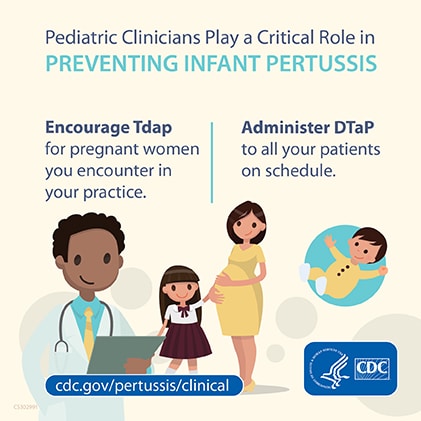Prevention
The best way to protect against pertussis is with vaccines. Clinicians can also use preventive antibiotics to protect people who have been exposed and are at high risk of developing severe pertussis.

Pediatric clinicians are in a unique position to prevent infant pertussis. Administer DTaP to all patients on schedule and encourage Tdap for pregnant women you encounter in your practice.
CDC recommends pertussis vaccination for
- Infants and children
- Adolescents
- Adults
- Pregnant women
See Diphtheria, Tetanus, and Pertussis Vaccination: Information for Healthcare Professionals for information on all pertussis vaccine recommendations by vaccine, age, and indication.
CDC supports targeting postexposure antibiotic use to persons at high risk of developing severe pertussis and to persons who will have close contact with those at high risk of developing severe pertussis. Learn more about use of PEP.
CDC recommends practicing good hygiene to prevent the spread of respiratory illnesses. Clinicians can encourage their patients to
- Cover their mouth and nose with a tissue when they cough or sneeze
- Put their used tissue in the waste basket
- Cough or sneeze into their upper sleeve or elbow, not their hands, if they don’t have a tissue
- Wash their hands often with soap and water for at least 20 seconds
- Use an alcohol-based hand rub if soap and water are not available
- Evaluating Revaccination of Healthcare Personnel
- Pertussis: Summary of Vaccine Recommendations
Table of DTaP and Tdap vaccine recommendations across the lifespan - Tdap for Pregnant Women
Information about the best way to protect newborns from pertussis, including safety, side effects, and efficacy of receiving Tdap during pregnancy. - Pertussis Communication and Print Resources